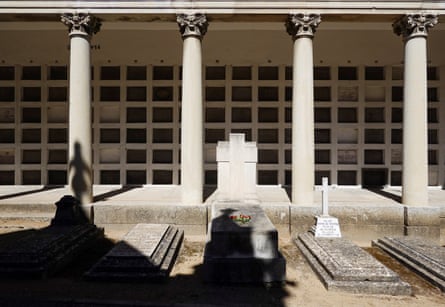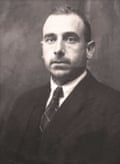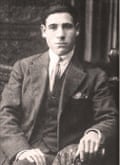Nearly four years after Franco’s remains were removed from the hulking Valley of the Fallen mausoleum outside Madrid, those of José Antonio Primo de Rivera, the founder of the Falangist party, are to be exhumed from the same site and reburied in a cemetery in the Spanish capital.
The removal of Primo de Rivera’s remains follows the introduction last year of the Socialist-led government’s Historical Memory law, which aims to bring “justice, reparation and dignity” to the victims of the Spanish civil war and subsequent dictatorship.
Among its measures is the “redefinition” of the Valley of the Fallen – now known by its original name, the Valley of Cuelgamuros – to end its glorification of Franco and his regime.
The basilica, a huge mausoleum 40 miles outside Madrid partly built by political prisoners used as forced labour, is ostensibly dedicated to the memory of all those killed on both sides in the 1936-39 conflict.
But only two of the graves beneath the basilica’s 150 metre-high cross were ever marked: those of Franco and of Primo de Rivera.
Around them lie the bodies of 34,000 people, republicans and nationalists, which were disinterred from resting places across Spain and buried anonymously in the church in an apparent attempt at reconciliation.
On Monday, the family of Primo de Rivera, who was executed in November 1936 after being convicted of conspiring against the republican government, will have his body exhumed from the site and taken to San Isidro cemetery in Madrid for reburial.
After the approval of the Democratic Memory law last October, Primo de Rivera’s relatives announced their intention to exhume his body and have it reburied, as he had requested, “in holy ground and in accordance with Catholic rites”.

In a statement obtained by Spain’s ABC newspaper, the family said the decision meant the authorities would not have to conduct the exhumation as laid out in the new law, adding: “The exhumation process should, and will, remain a strictly private family affair so that it doesn’t become a public spectacle that could lead to confrontations between Spaniards.”
Félix Bolaños, the cabinet minister responsible for overseeing the new law, declined to give details of Monday’s exhumation “on security grounds and in the interests of the family’s privacy”. But he said the move was further proof of the government’s commitment to confronting the past.
“It’s another step in what we’re doing with the Valley of Cuelgamuros, so that it’s not a place of homage where any person, or any ideology that evokes the dictatorship, can be glorified – as the memory law decrees,” he said.
Monday will be a bittersweet moment for those who have spent years facing legal hurdle after legal hurdle in their quest to recover the bones of their relatives from the basilica.
after newsletter promotion

Manuel Lapeña, a vet, and his brother Antonio, a blacksmith, were executed in the early days of the civil war, their bodies dumped in a mass grave in Calatayud, north-eastern Spain and then dug up decades later and reburied in the basilica without their families’ knowledge or permission.
In 2016, a court finally approved the exhumation of two brothers. But, seven years on, Purificación Lapeña, their granddaughter and grand-niece, is still waiting. Her father, Manuel, died at the age of 97 in 2021, and was never able to fulfil his wish to see his father exhumed and buried with dignity.

“Things haven’t changed for us – it’s all going very, very, very slowly,” said Purificación Lapeña, adding that legal delays and challenges were dragging things out.
“It’s all been little steps – unless you’re the family of Primo de Rivera, in which case, you ask for it and you get it straight away.”
Lapeña, who describes herself as patient but pessimistic, said she was worried about what a change of government after the general election at the end of this year would mean for the families of those still languishing in the valley.
Alberto Núñez Feijóo’s conservative People’s party (PP), which is leading the Socialists in the polls, has said it will repeal the law if it wins the election. The party’s previous leader, Pablo Casado, said the law would serve only to “dig up grudges”, while the PP’s Mariano Rajoy – who was prime minister from 2011 to 2018 – boasted of cutting Spain’s historical memory budget to zero after his administration inherited the 2007 law.
Purificación Lapeña said she had never expected the recovery of her grandfather and great-uncle’s remains to be easy – or quick.
“When it all started, everyone was like, ‘At last! Let’s go!’, and I was like, ‘Calm down, we know how this works,’” she said. “I knew it would take a long time because there are still a lot of Francoists with power and money and lawyers, who want everything to take as long as possible. They think people will die off and it will all be forgotten.”

